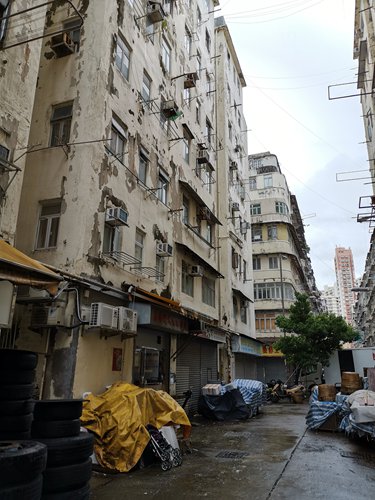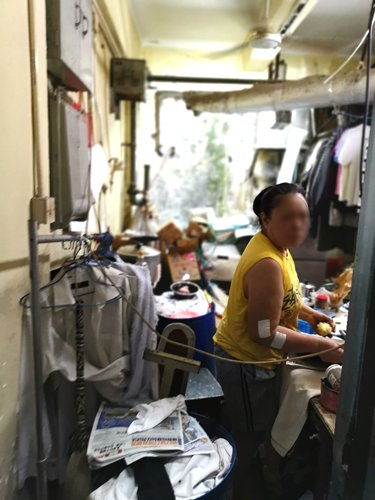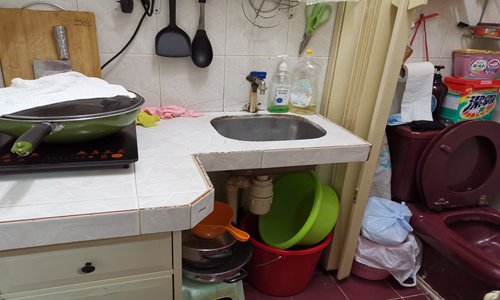HOME >> CHINA,SPECIAL-COVERAGE
HK must also tackle social issues
By Wang Cong in Hong Kong Source:Global Times Published: 2019/9/9 20:23:40
Ending violence priority, tackling problems key to stability

The "Tong Lau" apartment buildings in the Kowloon area in Hong Kong. Photo: Wang Cong/GT
As the Hong Kong Special Administrative Region (HKSAR) government takes concrete measures to end months of political unrest in the city, it must also tackle an array of deep-seated social problems to ensure long-term stability, some local residents and community and business leaders said.While persistent violence and vandalism on the streets underscored the dangerous rise of radical and secessionist voices in the city that must be contained, the protests over the past few months also reflected the accumulation of social problems ¬ from housing to employment ¬ that also require urgent attention and cooperation with the mainland, the people noted.
Public grievances
In visits to various communities in the city and interviews with dozens of residents and community and business leaders, the Global Times found that one of the most prevalent and challenging problems facing the city is housing, which is also the main source of public grievances, and even anger.
"I don't like what they are doing on the streets, but the young people have a lot of anger," a resident at a low-income community in the Kowloon area, who only gave her surname as Lee, told the Global Times. She said many youngsters don't have jobs and a place to live in. "What are they supposed to do?" she asked.
The community is composed of many old buildings known here as "Tong Lau" or "Chinese buildings," which were built in the 1960s when the city was still under British colonial rule. It is considered to have some of the poorest living conditions in the city, with families living in subdivided, tiny, windowless apartments that, in some cases, only have room for a bed. In one apartment, the stove and toilet were right next to each other.

A tenant cooking lunch at a packed small room that serves as a laundry shop, a kitchen and bedroom for workers in a "Tong Lau" in the Kowloon area in Hong Kong. Photo: Wang Cong/GT
A community leader, who helped with the visit, told the Global Times that about 1 million Hong Kong residents ¬ or one in six ¬ live in similar conditions, though other estimates are much lower. But one thing is clear: The housing problem is not limited to low income earners, but also young professionals.A young finance sector worker, who goes by his last name Law, lives in a high-end apartment in the city with his wife, a government employee. Though the building was nicely kept and has many amenities, their studio apartment of about 30 square meters can barely fit all their belongings, and the rent of HK$18,000 ($2,526) takes almost 40 percent of their combined earning of HK$50,000.

The bathroom/kitchen of an tiny apartment in a "Tong Lau" in the Kowloon area in Hong Kong on September 2. Photo: Wang Cong/GT
"There is a long way to go," said Law, when asked about their plans to buy a house.Apart from the expenses, Law and her wife are heavily in debt, including HK$200,000 in student loans and a HK$100,000 loan for their wedding.
Law said many people are angry and he "understands and respects peaceful protesters." But he believes "political protests will not help address life problems."

Inside a packed small room that serves as a laundry shop, a kitchen and bedroom for workers in a "Tong Lau" in the Kowloon area in Hong Kong. Photo: Wang Cong/GT
Complex hurdles
Hong Kong Chief Executive Carrie Lam Cheng Yuet-ngor on Wednesday announced a four-action plan to start dialogue and find solutions, including inviting community leaders, professionals and academics to independently examine and review deep-seated social problems.
Still, radical protesters continue to ignore the call for peace and dialogue and engaged in more violent activities over the weekend, including arson outside subway stations.
"The problem is complicated. It's not that the government is not trying, it's just that there are too much hurdles to get anything done quickly," Jimmy Lam Pok, a district council member in Kowloon, told the Global Times.
He said the government has proposed taking down the Tong Lau in Kowloon and building high rises with more units. But many, including some tenants, are opposed to it because they fear they won't be able to afford them.
The Hong Kong government has also proposed building artificial islands for more houses, but opposition politicians are blocking it. "They are opposed to whatever the government is trying to do," he said.
Business leaders like Jonathan Choi Koon-shum, chairman of the Chinese General Chamber of Commerce, said that the answer to the social issues in Hong Kong lies in expanded cooperation with the mainland.
"For Hong Kong to be successful, the most important thing is the economy and people's livelihood, and regional cooperation with the mainland is the only direction for that," Choi told the Global Times on Thursday.
Choi said that major initiatives, such as the Guangdong-Hong Kong-Macao Greater Bay Area development plan and other regional cooperation platforms, provide a lot of opportunities for Hong Kong.
"Without working with the mainland, Hong Kong has no future," he said. "I think everybody should know that."
Newspaper headline: HK must solve social issues
RELATED ARTICLES:
Posted in: SOCIETY,HK/MACAO/TAIWAN,FOCUS NEWS